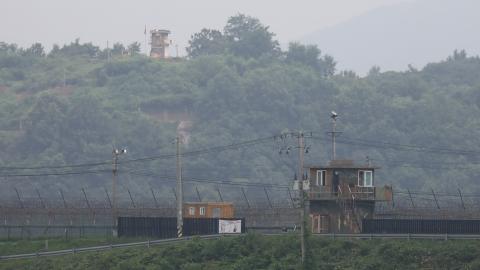Foreigners rarely seek safety in North Korea — for good reason. The Kim regime guarantees its survival through internal terror and external threats.
Pvt. Second Class Travis King may have thought a mad dash across the Military Demarcation Line separating North and South Korea would shield him from harm. But he erred if he believed a tyranny would better protect individual liberties than a democracy.
King’s woes have just begun. And he’s sparked a diplomatic headache for US officials who will want to do everything possible to prevent him from becoming a casualty of a brutal North Korean system.
Many wonder what could have prompted this young man to flee into the open arms of the North Korean security apparatus.
Fear and ignorance are the likely answers. Travis King’s run-ins with South Korean authorities made him unfit to serve among the 28,500 American troops helping to defend the peninsula. He was about to board a plane en route to Fort Bliss, Texas, to face further disciplinary action for assault and disorderly conduct. The Uniform Military Code of Justice can seem draconian to a soldier. To avoid that scenario, King joined and then ditched an international tour of the Joint Security Area at Panmunjom to take his chances with North Korean authorities.
If King had known about the tragedy that befell Otto Warmbier, he would be safer now. Otto was the University of Virginia student apprehended and jailed in 2016 for stealing a propaganda poster from a Pyongyang hotel; he was ultimately returned in a coma and died. Otto Warmbier’s name is a living reminder of the difference between America’s freedom and the cruelty of dictatorships.
King’s interrogators may be careful as they ascertain his motives for seeking refuge in North Korea. If he wants to defect and is willing to be a propaganda tool, he may earn a living in North Korea; if not, negotiations for his return will depend on the economic benefits that might be extracted from the United States.
While North Korean officials will remain suspicious of the American private, they will want to use this opportunity to reinforce narratives for domestic and foreign audiences.
North Korea’s economy is suffering, with food shortages the worst since the great famine of the mid-1990s. Kim Jong Un hews to a byungjin policy line meant to bring both strategic weapons and economic prosperity to the Hermit Kingdom. The regime is delivering on the first half of that bargain, as indicated by the recent test of the solid-fuel Hwasong-18 intercontinental ballistic missile that can reach any part of US territory.
North Korea remains dependent on China for its economic survival. Borders were closed for the pandemic, but as they have begun to open this year, the number of North Koreans seeking to escape to China has also started to grow again.
Alarm bells are ringing in South Korea and among human-rights groups. More open borders with China may also mean that Beijing starts the forcible repatriation of the more than 2,000 North Koreans already in China. Unfortunately, the United Nations system is doing little to ensure China is held accountable for the welfare of those defectors.
So while the Kim regime can parade Travis King to shore up domestic support, it can also use the incident to tarnish the US-South commemoration of the 70th anniversary of the Korean War armistice and ongoing allied efforts to strengthen defense and deterrence.
The incident may produce a moment of US-North Korea diplomatic engagement. Diplomacy stalled after the failed 2019 summit in Hanoi, Vietnam and North Korea has generally rebuffed the diplomatic efforts of the Biden administration and South Korea’s Yoon government. It would be ironic if a private’s misconduct and escape artistry catalyzed a meaningful breakthrough in dialogue with North Korea. It also would be most surprising.
But engagement over a single American will unlikely alter North Korea’s focus on building its strategic, space and cyber forces. Kim rightly thinks the intensified rivalry between the United States and China and Russia gives North Korea broader leeway to act without fear of further sanctions or other penalties.
By fleeing to North Korea, Pvt. Second Class Travis King has compounded his troubles, not escaped them. And while we can hope that one day North Korea will be willing to engage in meaningful diplomacy with the United States, the best we can hope for in the short run is that Travis King finds his way home alive.




















